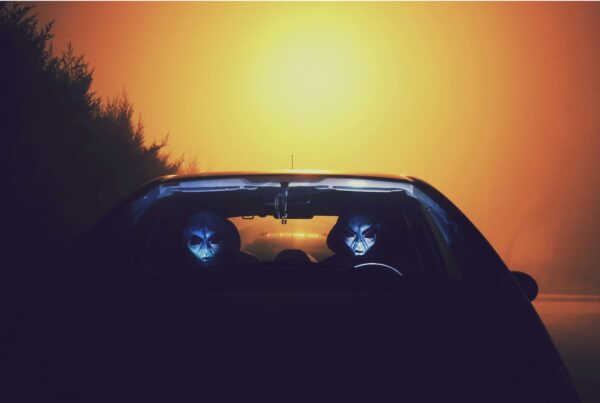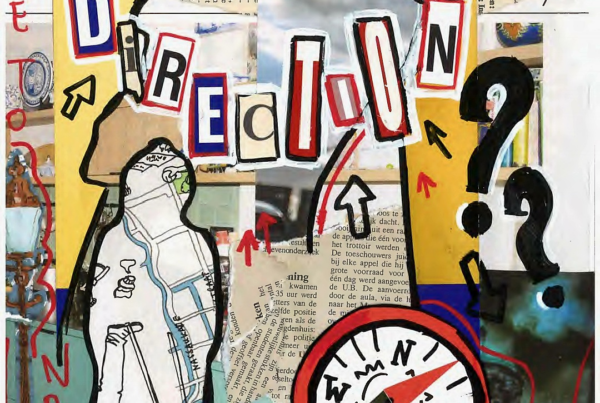
In the past, when it came to future plans, preoccupation with doing things by the book used to be far more common. Expectations on what to do, in what order, and when were far more static. Whether it was memorising how to perfectly sell your professional reorientation in your next job interview, or the deep-seated unease you felt when you were between jobs, the message rang loud and clear: you had to have it all figured out. Nowadays, nonlinear career paths are – at least in some parts of the world – becoming the norm. They involve following an unconventional trajectory with various roles and sometimes in different industries. So, we decided to visit some members of the psychology faculty, Lucas Molleman, and Rebeka Rotter who embody the definition of professional exploration.

Photo by Clay Banks on Unsplash
Lucas Molleman
Lucas Molleman has been at the Developmental Psychology programme group at the UvA since 2021. His research areas include evolutionary biology, behavioural economics, and of course, (social and developmental) psychology.
Background:
He started off with a Bachelor’s in Biology, following this with a Master’s that took on a more Ecology-related spin. Parallel to this, Lucas pursued a second Master’s in Philosophy, since – to his convenience – the philosophy lectures were all in the evening. Along the way, he became more interested in the evolutionary aspects of biology, which led him to do his PhD in this field, where he worked with relatively complex models developed in genetic evolution, trying to apply them to cultural evolution. In the final stages of his PhD in Groningen, Lucas became more involved in experimental research, leading him to work within the field of Experimental Economics in Nottingham, where he studied learning strategies. Here, he was able to continue doing something he liked, while building on his background theoretical knowledge.
From that point, his step to Psychology was a smaller one, since both disciplines study social behaviour from an experimental point of view. Lucas continued studying human social behaviour but in a more psychology-related field at the MPI for Human Development in Berlin, where he looked at how learning behaviour changes from childhood to adolescence. Between Berlin and today, he moved back to the Netherlands to do a Postdoc and spent a year as a lecturer for social psychology at Tilburg University.
What are your insights from participating in many different research areas?
‘I think the cool thing is you get exposure to very different kinds of thinking in different fields. Different types of departments, from evolutionary biology to experimental economics have very very different perspectives on how to explain human behaviour. On the other hand, I always feel like the odd one out – I think many people have that – in evolutionary biology I always felt I’m not really an evolutionary biologist. In experimental economics, I was a biologist, in psychology I was the economist, and now I’m here. So, it always feels a bit like I know a little bit on many things, or actually don’t know enough on anything.’
Additional comments on working in academia?
‘I’m not sure the culture is so different in academia and commercial/government. I think everywhere you have bureaucracy and power politics – different stuff that stands in your way […] Being an academic gives you much freedom in making your time schedule every week as you like. If you make choices so that your work aligns with your personal interest, then it never really feels like work. Also, in a way, you’re never really ‘free’, because when you’re free you start thinking about the research problem that you’re on. But it never feels like work, so that’s a really good thing, that it’s always nice to be doing stuff.’
What are you up to now?
Currently, Lucas is pivoting from experimental research back to theory. ‘Psychology lacks grounding theories that combine ideas. Most theories are unconnected to each other. There are all kinds of micro-theories and they do not connect back to any overarching theory. For example in Economics, there’s the homo oeconomicus model that tries to at least have some overarching idea of how decisions are made and how behaviour can be explained (obviously with many drawbacks). But at least there’s an attempt to put everything under one framework. So now, I’m trying in a roundabout way to connect it back to evolutionary biology […] merging the evolutionary perspectives in development. For example, when one would expect more flexible versus more rigid learning strategies.’
Final thoughts?
‘One of the key things would be just to follow your personal interests and really do what you like, because this is the stuff you do all day. Do whatever you like as a person, so whatever appeals most to you. That I think makes you the most happy. If your life actually allows you to do this – I was lucky enough to be able to make these choices. I can imagine for not all students this would be as easy as it was for me, because some people have different constraints.
Rebeka Rotter
Since 2021, Rebeka Rotter has been a study advisor at the UvA. Her favourite part of her job is the face-to-face contact and the fact that she is actively involved in helping her students. Before this, she was also a study advisor at Laureate, which was exclusively online, with (mostly older) students from all over the world following online study programmes. Rebeka has a wide range of passions and interests – ‘Humans are not interested in one thing. I think most of us have interests in different areas.’
Background:
Rebeka studied Psychology in Romania, where she did a Master’s in Clinical Psychology and Genetic Counselling*, with the latter stemming from her fascination in how genes work and her love of studying. Eventually, her interest in criminal profiling led her to follow a post-graduate course in Forensic Psychology. She had read a lot about it and hoped to pursue a career in the field. ‘It’s fascinating that people can do what they do, and I wanted to understand their motives behind it […] I really liked the puzzling part. You have bits and pieces from let’s say a person […] and then you have to make an image out of it.’ Rebeka finished her studies during the financial crisis in Romania, which – despite her degrees – made it difficult to find employment opportunities. Her first psychology-related job involved matching job-seekers with job positions, and while she enjoyed working there, she began to ask herself what she wanted from her life and how to get the most out of it. This was when she realised that she really liked helping people. ‘Since I was a very young child, that was something that was in me.’
And so, she decided to devote one year of her life to volunteering. This took her to Ghana for four months, and then to Georgia. Between the two experiences, she met her husband, and they decided to take a course in Budapest to become teachers and spent the summer working in England at a summer camp. They then went to Thailand, where they found a job at the same school within a week. After spending a year working and 8 months travelling through Southeast Asia, they returned to the Netherlands. Here, Rebeka began her job at Laureate.
How do you use your background today?
‘What I learned in genetic counselling, I use more. I learned about communication strategies and how to speak to people.’ Also, in terms of becoming a counseller at Laureate, which was also a very international place – almost every single person was from a different country – there were three very important factors: ‘they looked for someone with a psychology background, because I worked as a teacher I think it was good, and because I travelled and have cultural knowledge. If you live all your life in one country with the same people, you won’t notice much, unless you are in contact with them. And if you have to actually go to other countries and live in other countries, then you actually notice differences, and you also learn to be more open minded, and more culturally sensitive. I think that was what they needed.’ These aspects of her experience were always included in her motivation letter – ‘It’s something that you get, but you can’t quantify it. It’s not like a diploma that you get. It’s something that you did and something you learned, even if it was by travelling or volunteering projects, it doesn’t matter.’
Final thoughts?
‘Very often I have students who say: ‘oh, I am so old’, and I ask them: ‘How old are you?’ – ‘22’. And I’m thinking ‘wow’. Then they say ‘I cannot do or change things because I am too old’ and I think of myself […] going to volunteer projects with young people – everybody there was 20, I was 30 – but I didn’t mind, because it was an opportunity I wanted. I would just advise students to not look at age. Because I don’t think age matters in this. I think many students are so stuck on their age, when it’s really irrelevant when you want to reach a goal.’
*Genetic counselling involves providing (a lot of) information to individuals who find out that either they or their child has a genetic disease. The counselling often takes place in the context of a hospital. For example, if parents find out their child has Down’s syndrome, individuals trained in genetic counselling inform them what this means and offer them support.

Photo by Clay Banks on Unsplash
Lucas Molleman
Lucas Molleman has been at the Developmental Psychology programme group at the UvA since 2021. His research areas include evolutionary biology, behavioural economics, and of course, (social and developmental) psychology.
Background:
He started off with a Bachelor’s in Biology, following this with a Master’s that took on a more Ecology-related spin. Parallel to this, Lucas pursued a second Master’s in Philosophy, since – to his convenience – the philosophy lectures were all in the evening. Along the way, he became more interested in the evolutionary aspects of biology, which led him to do his PhD in this field, where he worked with relatively complex models developed in genetic evolution, trying to apply them to cultural evolution. In the final stages of his PhD in Groningen, Lucas became more involved in experimental research, leading him to work within the field of Experimental Economics in Nottingham, where he studied learning strategies. Here, he was able to continue doing something he liked, while building on his background theoretical knowledge.
From that point, his step to Psychology was a smaller one, since both disciplines study social behaviour from an experimental point of view. Lucas continued studying human social behaviour but in a more psychology-related field at the MPI for Human Development in Berlin, where he looked at how learning behaviour changes from childhood to adolescence. Between Berlin and today, he moved back to the Netherlands to do a Postdoc and spent a year as a lecturer for social psychology at Tilburg University.
What are your insights from participating in many different research areas?
‘I think the cool thing is you get exposure to very different kinds of thinking in different fields. Different types of departments, from evolutionary biology to experimental economics have very very different perspectives on how to explain human behaviour. On the other hand, I always feel like the odd one out – I think many people have that – in evolutionary biology I always felt I’m not really an evolutionary biologist. In experimental economics, I was a biologist, in psychology I was the economist, and now I’m here. So, it always feels a bit like I know a little bit on many things, or actually don’t know enough on anything.’
Additional comments on working in academia?
‘I’m not sure the culture is so different in academia and commercial/government. I think everywhere you have bureaucracy and power politics – different stuff that stands in your way […] Being an academic gives you much freedom in making your time schedule every week as you like. If you make choices so that your work aligns with your personal interest, then it never really feels like work. Also, in a way, you’re never really ‘free’, because when you’re free you start thinking about the research problem that you’re on. But it never feels like work, so that’s a really good thing, that it’s always nice to be doing stuff.’
What are you up to now?
Currently, Lucas is pivoting from experimental research back to theory. ‘Psychology lacks grounding theories that combine ideas. Most theories are unconnected to each other. There are all kinds of micro-theories and they do not connect back to any overarching theory. For example in Economics, there’s the homo oeconomicus model that tries to at least have some overarching idea of how decisions are made and how behaviour can be explained (obviously with many drawbacks). But at least there’s an attempt to put everything under one framework. So now, I’m trying in a roundabout way to connect it back to evolutionary biology […] merging the evolutionary perspectives in development. For example, when one would expect more flexible versus more rigid learning strategies.’
Final thoughts?
‘One of the key things would be just to follow your personal interests and really do what you like, because this is the stuff you do all day. Do whatever you like as a person, so whatever appeals most to you. That I think makes you the most happy. If your life actually allows you to do this – I was lucky enough to be able to make these choices. I can imagine for not all students this would be as easy as it was for me, because some people have different constraints.
Rebeka Rotter
Since 2021, Rebeka Rotter has been a study advisor at the UvA. Her favourite part of her job is the face-to-face contact and the fact that she is actively involved in helping her students. Before this, she was also a study advisor at Laureate, which was exclusively online, with (mostly older) students from all over the world following online study programmes. Rebeka has a wide range of passions and interests – ‘Humans are not interested in one thing. I think most of us have interests in different areas.’
Background:
Rebeka studied Psychology in Romania, where she did a Master’s in Clinical Psychology and Genetic Counselling*, with the latter stemming from her fascination in how genes work and her love of studying. Eventually, her interest in criminal profiling led her to follow a post-graduate course in Forensic Psychology. She had read a lot about it and hoped to pursue a career in the field. ‘It’s fascinating that people can do what they do, and I wanted to understand their motives behind it […] I really liked the puzzling part. You have bits and pieces from let’s say a person […] and then you have to make an image out of it.’ Rebeka finished her studies during the financial crisis in Romania, which – despite her degrees – made it difficult to find employment opportunities. Her first psychology-related job involved matching job-seekers with job positions, and while she enjoyed working there, she began to ask herself what she wanted from her life and how to get the most out of it. This was when she realised that she really liked helping people. ‘Since I was a very young child, that was something that was in me.’
And so, she decided to devote one year of her life to volunteering. This took her to Ghana for four months, and then to Georgia. Between the two experiences, she met her husband, and they decided to take a course in Budapest to become teachers and spent the summer working in England at a summer camp. They then went to Thailand, where they found a job at the same school within a week. After spending a year working and 8 months travelling through Southeast Asia, they returned to the Netherlands. Here, Rebeka began her job at Laureate.
How do you use your background today?
‘What I learned in genetic counselling, I use more. I learned about communication strategies and how to speak to people.’ Also, in terms of becoming a counseller at Laureate, which was also a very international place – almost every single person was from a different country – there were three very important factors: ‘they looked for someone with a psychology background, because I worked as a teacher I think it was good, and because I travelled and have cultural knowledge. If you live all your life in one country with the same people, you won’t notice much, unless you are in contact with them. And if you have to actually go to other countries and live in other countries, then you actually notice differences, and you also learn to be more open minded, and more culturally sensitive. I think that was what they needed.’ These aspects of her experience were always included in her motivation letter – ‘It’s something that you get, but you can’t quantify it. It’s not like a diploma that you get. It’s something that you did and something you learned, even if it was by travelling or volunteering projects, it doesn’t matter.’
Final thoughts?
‘Very often I have students who say: ‘oh, I am so old’, and I ask them: ‘How old are you?’ – ‘22’. And I’m thinking ‘wow’. Then they say ‘I cannot do or change things because I am too old’ and I think of myself […] going to volunteer projects with young people – everybody there was 20, I was 30 – but I didn’t mind, because it was an opportunity I wanted. I would just advise students to not look at age. Because I don’t think age matters in this. I think many students are so stuck on their age, when it’s really irrelevant when you want to reach a goal.’



